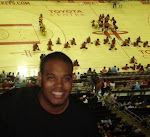 About a year ago I decided to learn to play an instrument, along with a few of my friends. Because of desirability, instruments already chosen by my friends, and my parent's desire to not hear incredibly noisy racket coming from upstairs in their home, I went with the acoustic guitar.
About a year ago I decided to learn to play an instrument, along with a few of my friends. Because of desirability, instruments already chosen by my friends, and my parent's desire to not hear incredibly noisy racket coming from upstairs in their home, I went with the acoustic guitar. When I finally purchased my first guitar (CraigsList), I went to Barnes & Noble to find a book that would teach me the basics--how to tune a guitar, restring it, play basic chords, and so forth. I found exactly what I was looking for, one that included a DVD with lessons for beginners.
What I didn't expect to find, though, was a spiritual lesson I was sorely in need of.
What follows is the introductory letter to my beginner's book, Simply Guitar. Without dumbing it down or overexplaining it to you, let me just say that from the very first time I read it I could almost hear God's voice sort of saying "You know...if this information is that groundbreaking to you, maybe you need to apply it in some OTHER aspects of your life." Things like patience and practicing/applying what you read seem like such simple concepts when learning a musical instrument, yet they seem so foreign and difficult at times when in the context of Bible study.
So read it for yourself. As you do, think of how the tips can apply to your Bible study and, ultimately, your spiritual life. I have tried to minimize the amount of bolding and underlining so you can just read it for yourself and not be worried about what I am thinking. Ok, I said I TRIED...but either way, enjoy:
Simply Guitar
To benefit from this book, I recommend you review all the materials as often as you can. Make sure you fully understand everything that has been discussed before you move on to other subjects.
The most important things to remember are the two ‘Ps’; patience and practice. Be patient enough to slow things down and run them over and over, refining your technique with the tips outlined in this book and practice daily.
You will not progress if you don’t practice. I cannot stress enough the importance of daily practice and a regimented, disciplined approach to doing so. Practice all of the priority topics before you mess around. Allocate a few minutes each day to focus purely on your technique. Critique your own playing – could you do that better? is your technique as good as it could be? Does that sound as good as when your teacher plays it? 15 minute practice Monday to Sunday is better than no practice during the week and eight hours on the weekend. (Doesn't that just SOUND like it's talking about how we CRAM all our time with God into one day a week? Oops, didn't mean to intterupt...)
Consolidate your knowledge. I teach a lot of students things that they don’t realize they already know, simply because they haven’t ‘joined the dots’. For example, if I can play a G major chord, I also know that the root not is a G note. Therefore, I know where the G note is on the neck. Using the musical alphabet, I can easily find F# or G# or any surrounding notes from that G note.
Make sure you think about everything you have learnt and everything you know, and try and ‘join the dots’. Try and apply the knowledge you have to your playing.
Listen to great guitar players. Listen to the guitar in songs that you like. Always try and define what you like about them and what you don’t like. Talk to musicians. Use the internet. Buy the videos and books to further your understanding of guitar. Get a good teacher. Try a few different teachers. Play with other guitar players, even if they are beginners. Teach other people what you know, because verbalizing and teaching is a great way to reinforce what you yourself have learnt.
In conclusion, I hope that you have understood my explanations and learnt a lot more than you knew before reading this book.
Keep playing!









No comments:
Post a Comment